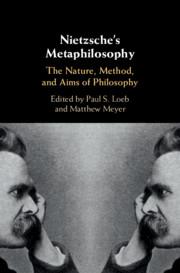Book contents
- Nietzsche’s Metaphilosophy
- Nietzsche’s Metaphilosophy
- Copyright page
- Contents
- Contributors
- Acknowledgments
- Note on Texts, Translations, and References
- Abbreviations
- Introduction
- Part I Evolving Metaphilosophies
- Chapter 1 Metaphilosophy and “Natural History”
- Chapter 2 The Dialectics of Nietzsche’s Metaphilosophies
- Chapter 3 Nietzsche as Metaphilosopher
- Part II The Nature of Philosophy
- Part III The Method of Philosophy
- Part IV The Aims of Philosophy
- Bibliography
- Index
Chapter 2 - The Dialectics of Nietzsche’s Metaphilosophies
from Part I - Evolving Metaphilosophies
Published online by Cambridge University Press: 24 October 2019
- Nietzsche’s Metaphilosophy
- Nietzsche’s Metaphilosophy
- Copyright page
- Contents
- Contributors
- Acknowledgments
- Note on Texts, Translations, and References
- Abbreviations
- Introduction
- Part I Evolving Metaphilosophies
- Chapter 1 Metaphilosophy and “Natural History”
- Chapter 2 The Dialectics of Nietzsche’s Metaphilosophies
- Chapter 3 Nietzsche as Metaphilosopher
- Part II The Nature of Philosophy
- Part III The Method of Philosophy
- Part IV The Aims of Philosophy
- Bibliography
- Index
Summary
Nietzsche presents a number of different conceptions of philosophy in his oeuvre. Thus, we cannot simply speak of Nietzsche’s metaphilosophy. Instead, we must speak of his metaphilosophies. This paper canvases the different conceptions of philosophy that appear in Nietzsche’s works and tries to make sense of the shifts that take place therein. Specifically, it tries to explain why Nietzsche rejects a traditional conception of philosophy as truth-seeking in both his earlier and later works and yet adopts this very conception of philosophy in Human, All Too Human, a work typically placed in his so-called middle period. To answer this question, it is argued that Nietzsche consciously adopts a traditional conception of philosophy in Human in order to show, in subsequent works of the free spirit, how that conception of philosophy undergoes a Selbstaufhebung or self-overcoming that makes possible a new conception of philosophy, one which is a form of Dionysian art, in his post-Zarathustra writings. In this way, we can speak of the dialectics of Nietzsche’s metaphilosophies.
- Type
- Chapter
- Information
- Nietzsche's MetaphilosophyThe Nature, Method, and Aims of Philosophy, pp. 22 - 41Publisher: Cambridge University PressPrint publication year: 2019

